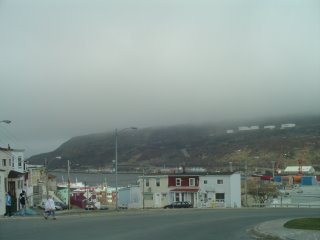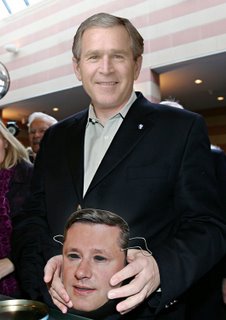All right, it's a slow day -- I'm here in my office so that students can hand in their papers to me, and beyond that I don't have much to do (well, actually, I have a
lot to do, but I'm taking this time to take a deep breath before a rather insane 48 hours of essay grading). So I thought I'd write a blog entry.
Aaaaaannd it got a little away from me. So if you're about to start reading, be warned that it goes on for quite a while. So go get a coffee, maybe a snack. Do you like music when you read? Perhaps you should turn some on.
Are you sitting comfortably? Then we'll begin ...
--------------------------------------
Well, on the heels of my last post ranting about the egregious idiocy of Bill O'Reilly seems as good a time as any to write a post on something that's been rattling around my head for a while now. I blogged a little while
back in passing about right-wingnut David Horowitz and his book
The Professors: The 101 Most Dangerous Academics in America. In and of itself, the book is yet more pap emerging from the conservative think tanks south of the border, and not really worth mentioning. I certainly couldn't do a better job of debunking the book than
Michael Berube does on a regular basis on his blog (of course, as someone actually
listed as one of the 101 most dangerous professors, Berube is in an ideal position to take on Horowitz, and does so with elan and ironic humour, something his shrill and thin-skinned opponent is notably lacking. For an example of what I mean, see
here).
No, what's been sort of rattling around in my head lately has to do with some recent efforts on the far right in the States to recuperate Senator Joseph McCarthy's reputation. Granted, this does tend to come from the more hysterical of the pundits (Anne Coulter is perhaps the Senator from Wisconsin's greatest advocate these days, though there are some
revisionist histories in the works as well), but the fact that it rather neatly parallels the entire Bush-wiretapping issue is somewhat disturbing.
It is still a fairly significant insult to be accused of "McCarthyite" tactics, and so the good Mr. Horowitz bristles rather quickly when anyone ventures to suggest that his book is all about "naming names," though he is quite glib when it comes to
accusing his detractors of tactics similar to those of Tailgunner Joe.
With the frequency with which McCarthy's name gets tossed around by people on both the left and the right, it's only good and proper that we hear it with a grain of salt and see it for what it is most of the time: namely, a reified term that simply connotes a bad guy in a black hat, a cartoon villain whose identification as a bombastic crypto-fascist buffoon tends to go largely unexamined and unquestioned in the popular imagination -- much in the same way that a Stephen Spielberg film uses Nazis as the bad guys, because they come with a whole series of qualities and traits that require no thought to decipher.
The problem is that Horowitz's tactics
are genuinely McCarthyite.
The Professors, in and of itself, is a joke, a punchline, that is not only poorly researched and reads like a cut-and-paste from some uberconservative version of Wikipedia, but also evinces a laughable ignorance of the realities of university life. A pervasive conspiracy on the part of over 50,000 professors to "purge" the academy of conservatives?? Please. Anyone who's ever sat in on a faculty meeting and watched a group of professors try to agree on changing the wording for an entry in the course calendar would have a good chuckle over that one. "Herding cats" is the phrase that comes to mind -- any conspiracy by academics would be stillborn at the first meeting during the fight that would ensue over what to name the cabal.
Further, the basis for Horowitz's book is the idea that these professors are "dangerous" not so much for personal politics as for their indoctrination of their students into leftist and anti-American sentiments. So: that being said, one would think that a key component of the book would be testimonials from students who were browbeat into writing Marxist essays, failed for articulating conservative ideas, and generally forced into a leftist mold, right? Not so much -- just the aforementioned brief bios. There is in fact no evidence offered at all that any of the 101 professors use their classes as soapboxes. I imagine that some probably do -- it is hard in any classroom context, never mind the humanities, not to let one's personality show through. But to suggest that this process is something akin to brainwashing gives professors way to much credit and students not enough. I can attest -- based on both class experience itself and course evaluations -- that in any given classroom context, a portion of the students think that what you say is brilliant, a portion think you're full of shit, and a (probably the largest) portion copy down what you say rather indifferently, spit it back on essays and exams, and promptly forget the keynotes of the course in a post-exam binge.
Hm. Look at that -- I had not intended a sustained critique of
The Professors, and yet couldn't help myself. Sorry about that. Anyway, as I was saying, Horowitz's tactics are in fact eminently McCarthyite.
The Professors is merely symptomatic, and in and of itself not worth talking about (except insofar as it makes me mad and liable to rant). More troubling, and what gives rise to this post, is the website
DiscoverTheNetwork.org. Better than me explaining it, go and check it out. I'll wait.
Back? Disturbed yet? My favourite page is the list of
individuals, laid out helpfully along a grid. More on this in a moment.
DiscoverTheNetwork was launched in 2005, spearheaded by Horowitz and various cronies from ultraconservative think tanks and publications. The overall premise of this site is that there exists a "network" of people, groups and organizations left of center who (a) sympathize with terrorists, (b) are anti-American, and (c) constitute a "shadow-party" influencing the Democrats.
I wish this site had been around while I was writing my thesis: it is pretty much a paradigm of conspiratorial thinking. Like most conspiracy theories, or manifestations of which Richard Hofstadter famously termed "the paranoid style in American politics," it proceeds from flawed deductive reasoning. When we think about it, conspiracy in its actual, documented forms as a criminal charge (conspiracy to commit murder, conspiracy to defraud) is something that is investigated and uncovered using
inductive reasoning -- that is, working from the particulars to a general rule (investigators uncover evidence, find connections, establish which connections are valid, and arrive at the shape of the conspiracy). Deductive reasoning, conversely, works from a general rule to particular instances (the famous example being All men are mortal, Socrates is a man, ergo Socrates is mortal). What happens in conspiratorial thinking is that the theorist ("paranoid spokesman," to again cite Hofstadter) assumes the conspiracy's existence from the outset and then formulates connections whose existence is predicated on -- what? Well, there is a conspiracy, therefore there must be connections. Something of a tautology, yes.
Senator Joseph McCarthy pretty much perfected this strategy. Starting with his infamous declarations in the Senate -- "There are [x number of] card-carrying communists in the state department!" -- he then proceeded in the HUAC hearings to defame individuals based on the flimsiest of conjectures and associations. The entire process was predicated on the acceptance of his basic premise: that the U.S. government and other high-profile organizations were riddled with communist agents actively working toward the demise of capitalism and apple pie. Or something.
Today, those intent on exhuming McCarthy invariably point to the fact that there
were communists at large in America, and that some were exposed by the hearings ... Alger Hiss being the most notorious example.
This is true enough. Also undeniable however is the collateral damage done by HUAC to people whose only crime had been attending a meeting out of curiosity in the 1930s, or owning albumns by Paul Robeson, or having a next-door neighour who had confessed to marxist sympathies -- people whose jobs were lost, who found themselves faced with the impossible choice of naming names they knew to be innocent or getting blacklisted.
The point of the McCarthyite conspiracy theorizing however was manifestly
not uncovering actual card-carrying communists so much as attacking the vestiages of 1930s-era, New Deal-style politics as manifested in the figure that so fired McCarthy's hatred: the east-coast, Ivy League liberal intellectual. Actual card-carrying communists were not all that hard to find: the American Communist Party never actually went underground, and remained in visible (if occasionally tenuous) existence throughout the most egregious years of McCarthy's inquisitions. The hapless individuals handing out pamphlets on streetcorners and harranguing factory workers were not his target.
Nor was actual ideology ever a point of questioning. Communism was not the object of inquiry, it was the weapon. The tireless "rooting out of traitors" proceeded along oblique and suggestive lines. The now-notorious "Are you now, or have you ever been, a member of the Communist Party?" was followed by questions about books the witness owned, their associations with liberal groups, the magazines to which they subscribed; "Your next-door neighbour admitted to attending a communist meeting in 1937" is the kind of bludgeon those called before the committee could expect.
Communism was thus figured not as a series of political philosophies so much as personal proclivities. McCarthy's most striking characterization was the commie-as-queer: spitting vitriol about "Whiny egg-sucking phony liberals," he established a series of associations starting with the limp-wristed intellectual and cringing liberal, connecting these to New Deal politics, New Deal liberalism with socialism, and socialism with communism. Not only was “Communism” divorced from theory, philosophy and ideology, but the imputation of intellectualism itself became a sign of Communist tendencies. It followed essentially the same logic as that which once stipulated that good girls don't chew gum -- because a girl who chews gum will smoke, a girl who smokes will drink, and a girl who drinks! Well, everyone knows what a girl who drinks will do ...
Turning back to DiscoverTheNetwork, let's look again at the page labelled "
Individuals." Here is Horowitz's
defense of it: "The picture grid is not a list of anything, except a small fraction of the raw contents of the site. It is an enticement not a thesis. It does not suggest any connections between these individuals, except in the sense that they all belong in a database about the left."
To claim that this grid does not suggest any connections here is simply disingenuous. Of course Horowitz cannot claim that Barbara Streisand is in cahoots with Sami Al-Arian, someone actually brought up at one point on terrorism charges: I'm hazy on libel laws, but I'm pretty sure that would be close to the line. Articulating concrete charges is not what this site is about: it is about establishing suggestive links between the left's own wingnuts -- our equivalents of Anne Coulter and Pat Robertson -- and the liberal mainstream. The classifications at the top of the page, I would argue, are designed to be incidental. The real point of the grid is imagistic rather than prescriptive: it works by proximity, not argument. Hence, we have an array (the grid is itself suggestive of a non-arbitrary ordering principle, a gesture to Weberian rationality) of individuals with less to do with each other than apples and oranges. We have apples and sea otters. Yet, the continuum proceeds by increments, taking us from idiots like Professor Ward Churchill (who called the victims of 9/11 "little Eichmanns") or a
dictator like Fidel Castro, through well-respected academics like Cornell West or populist filmmakers like Michael Moore, to such innocuous celebrities like Streisand, Bruce Springsteen and Martin Sheen (the picture of Sheen, incidentally, is cropped from a publicity still from
The West Wing).
This particular page is, effectively, the entire site in microcosm. Horowitz's protestation that it is "not a list of anything, except a small fraction of the raw contents of the site," ignores the fact that the rest of the site is more or less organized according to the same principle. Significantly lacking is anything outlining the structure of the "network" -- we are invited instead to "discover the network" for ourselves (interesting, in this respect, that Horowitz calls the Individuals page an "enticement"). Hence, we are invited to collapse the gulfs that lie between Sheik Omar Abdel and Howard Dean, Fidel Castro and George Clooney, Louis Farrakhan and Garrison Keillor (because, as we all know, the author of
Lake Wobegone Days constitutes a serious threat to American national security); between the ACLU and the IRA; between the Black Panthers and the Rainforest Alliance.
The temptation to laugh at the sheer absurdity this site represents is immense; as blogger
Rox Populi quips, "I haven’t had this much fun since I was handed a Lyndon LaRouche tract that tied the Hapsburgs to the Challenger explosion." I could add dozens of comparable examples that I encountered while researching my thesis, all just as absurd and laughable. It is the logic however informing this web site that makes me uneasy ... coupled with the knowledge that, in hindsight, Senator McCarthy was just as laughable. The student of a colleague, upon seeing
Good Night, and Good Luck apparently liked the film, but thought the guy playing McCarthy was "overacting" (the film used actual footage of the Senator, not an actor) ... but McCarthy was believable back in the day, and the fact that certain elements are now trying to exhume his bones gives me pause.



 The fog, she do roll in quick, don't she?
The fog, she do roll in quick, don't she?


